高山流水--成语故事中英文版
高山流水成语意思简单
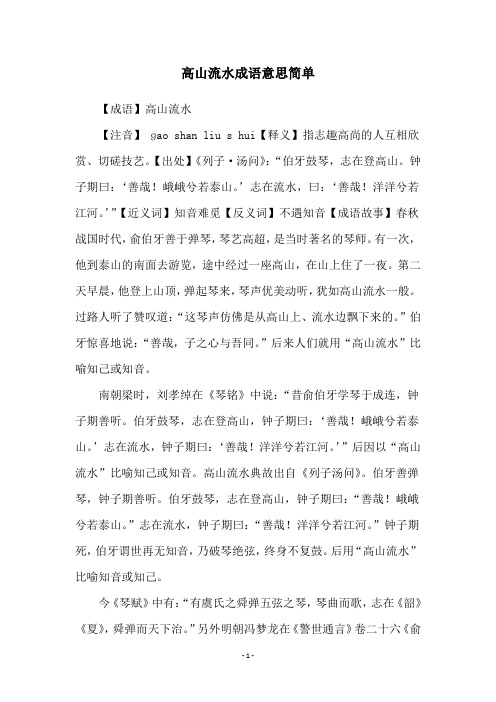
高山流水成语意思简单【成语】高山流水【注音】ɡao shan liu s hui【释义】指志趣高尚的人互相欣赏、切磋技艺。
【出处】《列子·汤问》:“伯牙鼓琴,志在登高山。
钟子期曰:‘善哉!峨峨兮若泰山。
’志在流水,曰:‘善哉!洋洋兮若江河。
’”【近义词】知音难觅【反义词】不遇知音【成语故事】春秋战国时代,俞伯牙善于弹琴,琴艺高超,是当时著名的琴师。
有一次,他到泰山的南面去游览,途中经过一座高山,在山上住了一夜。
第二天早晨,他登上山顶,弹起琴来,琴声优美动听,犹如高山流水一般。
过路人听了赞叹道:“这琴声仿佛是从高山上、流水边飘下来的。
”伯牙惊喜地说:“善哉,子之心与吾同。
”后来人们就用“高山流水”比喻知己或知音。
南朝梁时,刘孝绰在《琴铭》中说:“昔俞伯牙学琴于成连,钟子期善听。
伯牙鼓琴,志在登高山,钟子期曰:‘善哉!峨峨兮若泰山。
’志在流水,钟子期曰:‘善哉!洋洋兮若江河。
’”后因以“高山流水”比喻知己或知音。
高山流水典故出自《列子汤问》。
伯牙善弹琴,钟子期善听。
伯牙鼓琴,志在登高山,钟子期曰:“善哉!峨峨兮若泰山。
”志在流水,钟子期曰:“善哉!洋洋兮若江河。
”钟子期死,伯牙谓世再无知音,乃破琴绝弦,终身不复鼓。
后用“高山流水”比喻知音或知己。
今《琴赋》中有:“有虞氏之舜弹五弦之琴,琴曲而歌,志在《韶》《夏》,舜弹而天下治。
”另外明朝冯梦龙在《警世通言》卷二十六《俞伯牙摔琴谢知音》中写道:“自此子期知我心,更不曾提起伯牙琴。
”知音,相知相赏的朋友或对象,能够和自己心意相通的人;同志,同好,好朋友。
古人云:“高山流水”者,谓知音难遇也。
——《太平御览》卷七八五引《列子·汤问》:伯牙善鼓琴,钟子期善听。
伯牙鼓琴,志在登高山。
钟子期曰:“善哉!峨峨兮若泰山。
”志在流水,钟子期曰:“善哉!洋洋兮若江河。
”钟子期死,伯牙谓世再无知音,乃破琴绝弦,终身不复鼓。
汉末,“月旦评”为士人所重,许劭作《语林》,以评人物。
英语故事-高山流水

英语故事高山流水高山流水中文高山流水春秋时代,有个叫俞伯牙的人,精通音律,琴艺高超,是当时著名的琴师。
俞伯牙年轻的时候聪颖好学,曾拜高人为师,琴技达到水平,但他总觉得自己还不能出神入化地表现对各种事物的感受。
伯牙的老师知道他的想法后,就带他乘船到东海的蓬莱岛上,让他欣赏大自然的景色,倾听大海的波涛声。
伯牙举目眺望,只见波浪汹涌,浪花激溅;海鸟翻飞,鸣声入耳;山林树木,郁郁葱葱,如入仙境一般。
一种奇妙的感觉油然而生,耳边仿佛咯起了大自然那和谐动听的音乐。
他情不自禁地取琴弹奏,音随意转,把大自然的美妙融进了琴声,伯牙体验到一种前所未有的境界。
老师告诉他:“你已经学了。
”一夜伯牙乘船游览。
面对清风明月,他思绪万千,于是又弹起琴来,琴声悠扬,渐入佳境。
忽听岸上有人叫绝。
伯牙闻声走出船来,只见一个樵夫站在岸边,他知道此人是知音当即请樵夫上船,兴致勃勃地为他演奏。
伯牙弹起赞美高山的曲调,樵夫说道:“真好!雄伟而庄重,好像高耸入云的泰山一样!”当他弹奏表现奔腾澎湃的波涛时,樵夫又说:“真好!宽广浩荡,好像看见滚滚的流水,无边的大海一般!”伯牙兴奋色了,激动地说:“知音!你真是我的知音。
”这个樵夫就是钟子期。
从此二人成了非常要好的朋友。
故事出自《列子•汤问》。
成语“高山流水”,比喻知己或知音,也比喻音乐优美。
高山流水英文high mountain and running waterDuring the Spring and Autumn Period (chūn qiū春秋时期,770-476 BC), there was a man whose name was Yu Boya.Yu boya famous music master at that time, having a good command of the temperament and superb skills in playing the musical instrument. He was bright and eager to learn when he was young.He had formally acknowledged several experts as his teachers,and his skills in playing the musical instrument had already reached a fairly high level. But he still felt that he could not superbly express the various things which had deeply impressed him.Knowing what was in his mind, his teacher took him to the penglai Island,a fabled abode of immortals,on the East China Sea by boat.On the island,his teacher let him enjoy the natural scenarios and listen to the roaring of the great waves.looking into the distance,Boya saw that the waveswere turbulent and that the white breakers leapt skywards.Sea birds were circling in the air,and their crying was very pleasant to the ear.Trees were green and intriguing feeling welled up in his mind,as if he had heard the harmonious and charming music of nature.He couldn’t help taking his musical instrument and playing it .He followed his inclinations while he was playing,and incorporated the beautiful nature with his music,thus reaching a realm of thought he had never experienced before.Seeing this,the teacher said to hime,’You have mastered the art of playing.”Once,on the 15th day of the 8th lunar month,he was boating for sight-seeing.The moon was bright and a cool breeze was blowing gently.With myriads of thoughts welling up in his mind,he began to play the musical instrument.The melodious music became more and more beautiful when a man on the bank shouted “bravo!”Hearing the shouting,Boya came out of the boat,and saw a woodcutter standing on the bank.He knew that this man was keenly appreciative of his talents,because he understood his music.He immediately invited the woodcutter to his boat and ,full of zest,he played the musical instrument for him.When Boya played a piece of music eulogizing the highmountains,the woodcutter said,”wonderful!The melody is as magnificent and dignified as Mount Tai which reaches to the sky!”When he played a piece of music depicting the turbulent waves,the woodcutter said,”Wonderful!The melody is as vast and mighty as the great rivers!”Boya was excited,and siad,”Bosom friend!You are really my bosom friend!”That woodcutter was Zhong Ziqi.Since then,they had been very good friends.This story appears in The Works of Lie Zi.From this story,people havederived the set phrase”high mountain and running water” to refer to understanding and appreciative friends.This set phrase is also used to refer to melodious music.。
高山流水的意思及故事

高山流水的意思及故事【成语】:高山流水【拼音】:[gāo shān liú shuǐ]【解释】:“高山流水”典故最早见于《列子·汤问》。
在人们的用典实践中,这一典故逐渐发展出七十余个典形和乐曲高妙、相知可贵、知音难觅、痛失知音、闲适情趣等典义,还存在典故反用现象。
【出处】:《列子·汤问》版伯牙善鼓琴,钟子期善听。
伯牙鼓琴,志在高山。
钟子期曰:“善哉!峨峨兮若泰山!”志在流水,钟子期曰:“善哉!洋洋⑴兮若江河!”伯牙所念,钟子期必得⑴之。
【举例造句】:这种高山流水之乐,真是人间难得几回闻。
【成语典故】:当时的楚国有个读书人,姓伯,名牙。
他很喜欢弹琴,从小跟一位名叫连城的`先生学琴。
伯牙天资聪颖,琴艺大进,但却很难捕捉到乐曲的神韵。
一日,老师对伯牙说:“我带你去寻一个仙师点化点化,好吗?伯牙一口答应,高高兴兴地背着琴随老师乘船来到东海蓬莱山,老师让他坐地休息,自己去找老师去了。
伯牙在这巍峨苍郁的山野之中,久等不见老师归来,便沿一条山路寻去。
绕过一个山头之后,不想却有一幅奇景挂在眼前:真是云中飞瀑,雾中清泉,水花四溅如珍珠,激音回荡如仙乐。
伯牙顿感天眼大开,灵感涌起,便席地而坐,抚琴而成妙曲。
突然,他的身后传来老师的声音:“哈哈,哈哈……仙师被你找到了。
”伯牙恍然大悟,原来老师所说的仙师就是大自然啊。
相传《水仙操》和《高山流水》这两首古琴曲都是伯牙当时成就的。
从此,他的琴艺达到了炉火纯青的境界,但却始终没能找到一个知音。
后来,伯牙到晋国做了大夫。
一日,他奉命出使楚国。
因遇大风,只好在汉阳江口停留。
待风平之后,一轮仲秋之月便从浮云中漫步而出。
伯牙站立船头,仰视明月,俯视江面水波,琴兴大发,便抚琴而弹。
一曲即终,忽从草丛中跳出一个樵夫来,此人对伯牙的琴艺赞叹不已。
伯牙大惊,便问道:“你会听琴,你能识琴之优劣吗?”樵夫接琴观之,答道:“此琴叫瑶琴,是伏羲氏所造,取树中良材梧桐的中段做成。
成语故事:高山流水、管鲍之交、刮目相看、抱薪救火、不耻下问

抱薪救火 bào xīn jiù huǒ
战国末年,秦国采取远交近攻的 政策,不断并吞邻近的国家,好 扩大自己的领土。其中,秦国曾 经三次进攻魏国,占领魏国许多 的土地,魏国军民也伤亡惨重。
有一回,秦国又派乒攻打魏国, 魏国于是请韩、赵两国援助,可 惜兵力太弱,最后还是被打败。
抱薪救火
大将段干子提议把南阳割让给秦国 求和,战略家苏代却持反对的意见, 他说:秦国想并吞魏国,只割让土 地是无法满足秦国的野心,就像抱 着柴火去救火,柴没烧完,火是不 会灭的。
后来,大家在称赞朋友之间有很好的友 谊时,就会说他们是“管鲍之交”。
小故事大道理
“管鲍之交”一直被誉为交友的最高境界,成为被历代传诵的佳话。 可见真正的朋友应当患难与共,为了国家的利益能不计个人得失同 心协力。就像桓公不计较私仇,任用管仲终成霸业,其使贤任能之 举,也对后人产生了积极的影响。
不计较个人私利,有宽以待人的胸怀,有至真至诚、甘愿吃亏的精 神;在同事有某种过失或对不住自己时,不恶意相讽,而善意相讳, 同时又不为小人谗言而左右;能像管仲那样,在公事国事上尽职尽 责,在原则问题上不以恩报德,不私其友,刚正不阿;如果互相之 间都能够情同管鲍,多一些理解,多一点真诚,那么我们前进道路 上的困难就会少一些。
管鲍之交
不久之后,大王子诸被人杀死,齐国真 的发生了内乱,管仲想杀掉小白,让纠 能顺利当上国王,可惜管仲在暗算小白 的时候,把箭射偏了,小白没死,后来, 鲍叔牙和小白比管仲和纠还早回到齐国, 小白就当上了齐国的国王。小白当上国 王以后,决定封鲍叔牙为宰相,鲍叔牙 却对小白说:“管仲各方面都比我强, 应该请他来当宰相才对呀!”小白一听: “管仲要杀我,他是我的仇人,你居然 叫我请他来当宰相!”鲍叔牙却说: “这不能怪他,他是为了帮他的主人纠 才这么做的呀!”小白听了鲍叔牙的话, 请管仲回来当宰相,而管仲也真的帮小 白把齐国治理的非常好呢!
中国历史故事英文版:高山流水的历史故事
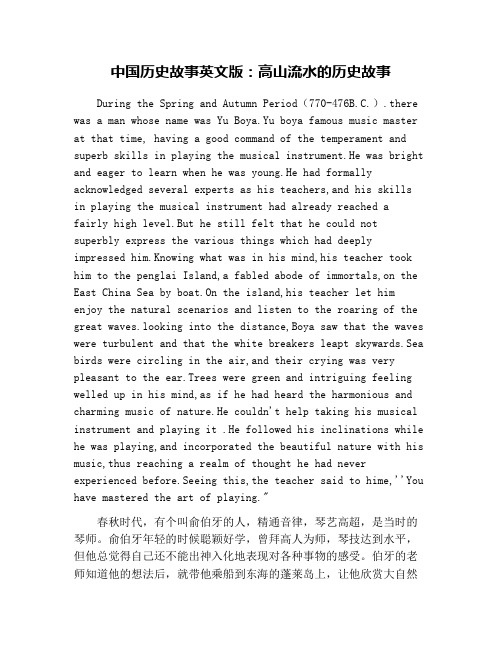
中国历史故事英文版:高山流水的历史故事During the Spring and Autumn Period(770-476B.C.).there was a man whose name was Yu Boya.Yu boya famous music master at that time, having a good command of the temperament and superb skills in playing the musical instrument.He was bright and eager to learn when he was young.He had formally acknowledged several experts as his teachers,and his skillsin playing the musical instrument had already reached afairly high level.But he still felt that he could not superbly express the various things which had deeply impressed him.Knowing what was in his mind,his teacher took him to the penglai Island,a fabled abode of immortals,on the East China Sea by boat.On the island,his teacher let him enjoy the natural scenarios and listen to the roaring of the great waves.looking into the distance,Boya saw that the waves were turbulent and that the white breakers leapt skywards.Sea birds were circling in the air,and their crying was very pleasant to the ear.Trees were green and intriguing feeling welled up in his mind,as if he had heard the harmonious and charming music of nature.He couldn't help taking his musical instrument and playing it .He followed his inclinations while he was playing,and incorporated the beautiful nature with his music,thus reaching a realm of thought he had never experienced before.Seeing this,the teacher said to hime,''You have mastered the art of playing."春秋时代,有个叫俞伯牙的人,精通音律,琴艺高超,是当时的琴师。
高山流水的成语故事及解释
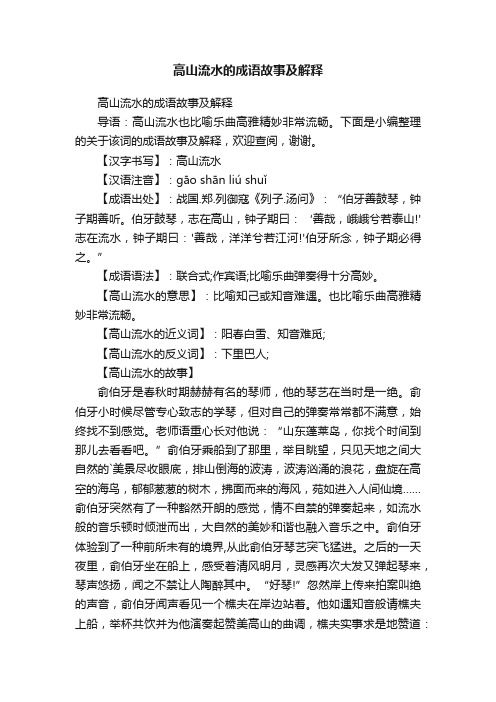
高山流水的成语故事及解释高山流水的成语故事及解释导语:高山流水也比喻乐曲高雅精妙非常流畅。
下面是小编整理的关于该词的成语故事及解释,欢迎查阅,谢谢。
【汉字书写】:高山流水【汉语注音】:gāo shān liú shuǐ【成语出处】:战国.郑.列御寇《列子.汤问》:“伯牙善鼓琴,钟子期善听。
伯牙鼓琴,志在高山,钟子期曰:‘善哉,峨峨兮若泰山!'志在流水,钟子期曰:'善哉,洋洋兮若江河!'伯牙所念,钟子期必得之。
”【成语语法】:联合式;作宾语;比喻乐曲弹奏得十分高妙。
【高山流水的意思】:比喻知己或知音难遇。
也比喻乐曲高雅精妙非常流畅。
【高山流水的近义词】:阳春白雪、知音难觅;【高山流水的反义词】:下里巴人;【高山流水的故事】俞伯牙是春秋时期赫赫有名的琴师,他的琴艺在当时是一绝。
俞伯牙小时候尽管专心致志的学琴,但对自己的弹奏常常都不满意,始终找不到感觉。
老师语重心长对他说:“山东蓬莱岛,你找个时间到那儿去看看吧。
”俞伯牙乘船到了那里,举目眺望,只见天地之间大自然的`美景尽收眼底,排山倒海的波涛,波涛汹涌的浪花,盘旋在高空的海鸟,郁郁葱葱的树木,拂面而来的海风,苑如进入人间仙境……俞伯牙突然有了一种豁然开朗的感觉,情不自禁的弹奏起来,如流水般的音乐顿时倾泄而出,大自然的美妙和谐也融入音乐之中。
俞伯牙体验到了一种前所未有的境界,从此俞伯牙琴艺突飞猛进。
之后的一天夜里,俞伯牙坐在船上,感受着清风明月,灵感再次大发又弹起琴来,琴声悠扬,闻之不禁让人陶醉其中。
“好琴!”忽然岸上传来拍案叫绝的声音,俞伯牙闻声看见一个樵夫在岸边站着。
他如遇知音般请樵夫上船,举杯共饮并为他演奏起赞美高山的曲调,樵夫实事求是地赞道:“美妙的琴声雄伟而庄重,像是耸入云霄的泰山!”当他弹奏进入又一个高潮时,椎夫又说:“如此开阔,我像是看见了波涛滚滚的流水!”俞伯牙激动地说:“原来你就是我一直在找的知音啊!”樵夫的名字叫钟子期,从那以后他们就成了推心置腹的好朋友。
高山流水原文高山流水的成语故事
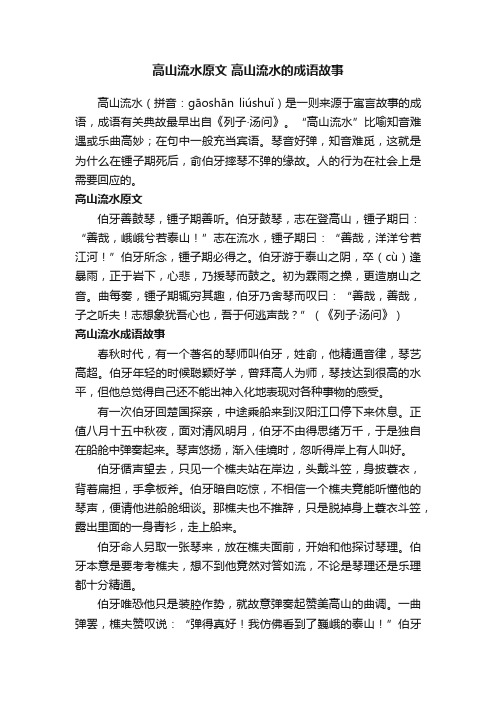
高山流水原文高山流水的成语故事高山流水(拼音:gāoshān liúshuǐ)是一则来源于寓言故事的成语,成语有关典故最早出自《列子·汤问》。
“高山流水”比喻知音难遇或乐曲高妙;在句中一般充当宾语。
琴音好弹,知音难觅,这就是为什么在锺子期死后,俞伯牙摔琴不弹的缘故。
人的行为在社会上是需要回应的。
高山流水原文伯牙善鼓琴,锺子期善听。
伯牙鼓琴,志在登高山,锺子期曰:“善哉,峨峨兮若泰山!”志在流水,锺子期曰:“善哉,洋洋兮若江河!”伯牙所念,锺子期必得之。
伯牙游于泰山之阴,卒(cù)逢暴雨,正于岩下,心悲,乃援琴而鼓之。
初为霖雨之操,更造崩山之音。
曲每奏,锺子期辄穷其趣,伯牙乃舍琴而叹曰:“善哉,善哉,子之听夫!志想象犹吾心也,吾于何逃声哉?”(《列子·汤问》)高山流水成语故事春秋时代,有一个著名的琴师叫伯牙,姓俞,他精通音律,琴艺高超。
伯牙年轻的时候聪颖好学,曾拜高人为师,琴技达到很高的水平,但他总觉得自己还不能出神入化地表现对各种事物的感受。
有一次伯牙回楚国探亲,中途乘船来到汉阳江口停下来休息。
正值八月十五中秋夜,面对清风明月,伯牙不由得思绪万千,于是独自在船舱中弹奏起来。
琴声悠扬,渐入佳境时,忽听得岸上有人叫好。
伯牙循声望去,只见一个樵夫站在岸边,头戴斗笠,身披蓑衣,背着扁担,手拿板斧。
伯牙暗自吃惊,不相信一个樵夫竟能听懂他的琴声,便请他进船舱细谈。
那樵夫也不推辞,只是脱掉身上蓑衣斗笠,露出里面的一身青衫,走上船来。
伯牙命人另取一张琴来,放在樵夫面前,开始和他探讨琴理。
伯牙本意是要考考樵夫,想不到他竟然对答如流,不论是琴理还是乐理都十分精通。
伯牙唯恐他只是装腔作势,就故意弹奏起赞美高山的曲调。
一曲弹罢,樵夫赞叹说:“弹得真好!我仿佛看到了巍峨的泰山!”伯牙凝神思索一阵,又换了一曲,这次是表现奔腾澎湃的流水。
樵夫听后说:“真妙!我好像看到了滚滚而来的河水!”只这两句,伯牙认定这个樵夫是自己千载难逢的知音。
高山流水 (gāo shān liú shuǐ)-英文版成语典故
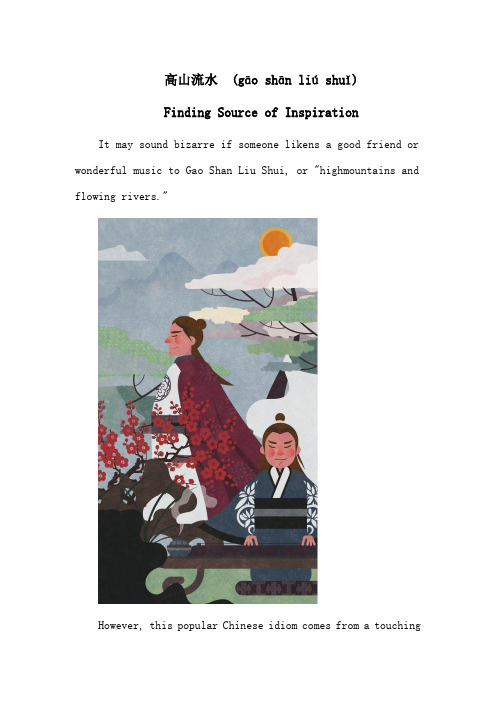
高山流水(gāo shān liú shuǐ)Finding Source of Inspiration It may sound bizarre if someone likens a good friend or wonderful music to Gao Shan Liu Shui, or "highmountains and flowing rivers."However, this popular Chinese idiom comes from a touchingstory about Yu Boya, a legendary virtuoso of guqin(a seven-stringed plucked instrument similar to a zither).Yu lived during the Spring and Autumn Period (770-476 BC) and when he was young, Yu loved playing guqin.He later became a student of Cheng Lian, the best guqin player of the time.Under Cheng's tutoring, Yu made remarkable progress and after three years of practice he had almostmastered the instrument.However, Yu felt that he still wasn't a real guqinvirtuoso and could not use it to express his feelings freely.One day, Cheng told his student: "I have taught you whatever I know, but I can see that you aren't quitesatisfied. So, I'll recommend you to another teacher who can bring your playing to perfection."Next morning, Cheng took Yu to the top of a mountain cliff overlooking the sea. "You wait here and your newinstructor will arrive in a few minutes." Then Cheng went away leaving Yu aloneon the top of the mountain.Yu waited and waited, but no one showed up. Then, gradually, he became enthralled by the sound of the seawaves crashing on the rocks below and the singing of the birds and whispering leaves in the nearby woods.When the sun began to set, it suddenly dawned upon Yu that the new instructor recommended by Cheng wasnone other than nature herself. Yu realized that only by learning from nature could he gain virtuosity of theinstrument. So, he found an inexhaustible source of inspiration and energy.Yu finally reached the level of perfection he had sought and became the best guqinplayer of his time. Butbecause of the profundity of his musical works, Yu found few people who could really understand them. Onlyhis bosom friend, Zhong Ziqi, could actually appreciate his talent and performances.When Yu was playing a new tune one day, Zhong became very excited. He said: "It's wonderful, I can see loftyMount Tai in front of me." Then Yu played another tune and Zhong clapped his hands, saying: "Bravo! It's justas melodious as the flowing rivers."Since then, people use "high mountains and flowing rivers" to describe a soul mate like Zhong Ziqi orwonderful music such as the works created by Yu Boya.。
- 1、下载文档前请自行甄别文档内容的完整性,平台不提供额外的编辑、内容补充、找答案等附加服务。
- 2、"仅部分预览"的文档,不可在线预览部分如存在完整性等问题,可反馈申请退款(可完整预览的文档不适用该条件!)。
- 3、如文档侵犯您的权益,请联系客服反馈,我们会尽快为您处理(人工客服工作时间:9:00-18:30)。
高山流水
High Mountains and Flowing Rivers
During the Spring and Autumn Period, more than 2000 years ago, there was a renowned musician called Yu Boya. He is an expert in composing and has a strong command of the Guqin, a seven string zither.
在2000多年前的春秋时代,有个叫俞伯牙的人,他精通音律,琴艺高超,是当时著名的琴师。
He was often referred to as the Saint of Guqin, and audiences lauded his performance when he started playing Guqin; it is said that even the horses would forget to eat when he was playing Guqin.
当时的人们把他尊为琴圣,每当他开始弹奏古琴的时候人们都称赞不绝;据说马儿听到他的琴声都会忘记吃草。
Although Boya earned a lot of respect and recognition in the music realm, he struggled to find someone who really understood him when he played the strings and echoed with nature.
虽然在音乐领域得到了许多赞美和认可,但伯牙依然在努力的寻找着一个知音,一个真正能懂他音律的知音。
One day, Boya went back to his hometown, where he sat in a wooden boat and floated down the river. Suddenly, a heavy downfall struck and Boya felt an urge to play his Guqin. The sounds of the Guqin mixed with the echoes from the river received a strong applause.
有一天,伯牙坐木蓬船回自己的家乡。
突然,外面下起了倾盆大雨,面对如此情景,伯牙情不自禁的弹起了古琴。
琴声与河里的雨声形成了强烈的共鸣。
"What a great performance!"
“多么美妙的声音啊!”
Boya looked around and found a woodcutter standing on the bank. He knew that this man was keenly appreciative of his talents, because he understood his music.
伯牙闻声环视,只见一个樵夫站在岸边,他知道此人能赏识自己的天赋,因为他能听懂自己的琴声。
"May I know your name? My friend? It seems we have the similar taste in music. Could you take some time to listen to my music?"
“朋友,你叫什么名字?感觉我们两个对音律的鉴赏能力很相似,你有时间听一下我的琴吗?”
The woodcutter, Zhong Ziqi, didn't know the musician is renowned Boya, he accepted the invitation of Boya and sat beside him on his boat.
这个樵夫叫钟子期,他不知道这个人就是著名的琴师俞伯牙。
他接受了邀请,上船后坐在了伯牙身边。
Boya played a piece of music eulogizing the high mountains. The woodcutter said, "The melody is as magnificent and dignified as Mount Tai which reaches to the sky!" Boya was shocked, because that was what he thought when he played the music.
伯牙弹了一首赞美高山的曲子。
樵夫说道:“真好!雄伟而庄重,好像高耸入云的泰山一样!”伯牙很震惊,因为那正是他在弹琴的时候所想到的场景。
He played another piece of melody depicting the turbulent waves, the woodcutter said, "The melody is as vast and mighty as the great rivers!" Boya was so excited, he finally found someone that can appreciate his music!
他又弹奏了一首表现奔腾澎湃的波涛的曲子,樵夫又说:“真好!宽广浩荡,好像看见滚滚的流水、无边的大海一般!”伯牙兴奋极了,他终于找到了能够欣赏他琴声的人了。
He held Ziqi's hand and said, "Bosom friend! Only you can understand my music!"
他抓住子期的手激动地说:“知音!你真是我的知音。
But Boya could not afford any more time to stay with Ziqi, so he made appointment with his new friend "I will come back to visit you in my return trip, I will bring you more music at then!"
但是伯牙要赶路回家,所以他对这位新朋友说:“等我回程的时候我会去拜访你,到时为你弹奏更多的曲子。
”
A Few months later, Boya came back to the river bank and tried to find his friend, but he heard a heartsick news, that Zhong Ziqi passed away because of an illness. Boya cried outright and play the melody of "High Mountains" and "Flowing Rivers" for his friend just like they first met each other on the river bank. After the melody, Boya sighed, "Nobody in
this world can understand me like you, who should I play for now?" Then Boya cut his seven strings into two parts and never played Guqin again.
几个月后,伯牙回到了那条河边并试着去找寻他的朋友,但是他得到了一个痛心的消息,钟子期得病亡故了。
伯牙痛苦不已,他像第一次见面时那样再次弹奏了高山和流水的曲子。
之后,伯牙自言自语道:“这个世界上没有人能像你那样懂我的琴声,你不在了,我该向谁弹奏呢?”突然,伯牙摔断了他的七弦琴,并且从此不再弹奏古琴。
